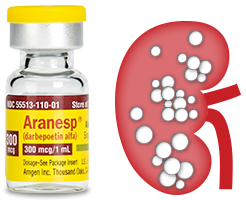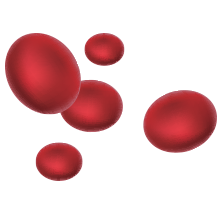
Aranesp® is a man-made form of erythropoietin, a human protein naturally produced by the kidney.1
Aranesp® is a prescription medicine used to treat a lower than normal number of red blood cells (anemia) caused by chronic kidney disease in patients on dialysis and not on dialysis.
Aranesp® is a prescription medicine used to treat a lower than normal number of red blood cells (anemia) caused by chemotherapy that will be used for at least two months after starting Aranesp®.
Aranesp® has not been proven to improve quality of life, fatigue, or well-being.
Aranesp® should not be used for the treatment of anemia:

Aranesp® is a man-made form of erythropoietin, a human protein naturally produced by the kidney.1

Aranesp® "tells" the cells in your bone marrow to grow into new red blood cells within your bloodstream.1

More blood cells mean a higher hemoglobin level, so that your blood can carry more oxygen to your organs and muscles.7
In a clinical study of patients with lung cancer, Aranesp® was shown to reduce the need for red blood cell transfusion by 48%.8
Aranesp® is used to treat a lower than normal number of red blood cells (anemia) caused by chemotherapy that will be used for at least two months after starting Aranesp®.
Aranesp® has not been proven to improve quality of life, fatigue, or well-being, and should not be used if:
If chemotherapy has caused you to develop anemia that cannot be managed with RBC transfusion, your healthcare provider may want to address your anemia in another way. Aranesp® can help.
Aranesp® is an erythropoiesis-stimulating agent, or ESA. An ESA is a man-made protein that helps activate the production of new red blood cells. More red blood cells means a higher hemoglobin level, so your blood can carry more oxygen to your organs and tissues.
By injection under the skin, either once a week or once every three weeks as prescribed by your healthcare provider.

Do not take Aranesp® if you:
Aranesp® may not be right for you. Tell your healthcare provider about all your health conditions, including if you:
Tell your healthcare provider about all the medicines you take, including prescription and nonprescription medicines, vitamins, and herbal supplements.
Know the medicines you take. Keep a list of your medicines with you and show it to your healthcare provider when you get a new medicine.
Aranesp® may cause serious side effects that can lead to death, including:
If you decide to take Aranesp®, your healthcare provider should prescribe the smallest dose that is necessary to reduce your chance of needing RBC transfusions.
If your hemoglobin level stays too high or goes up too quickly, this may lead to serious health problems which may result in death. These serious health problems may happen if you take Aranesp®, even if you do not have an increase in your hemoglobin level.
Before taking Aranesp®, tell your doctor if you: have heart disease; have high blood pressure; have had a seizure or stroke; or if you are pregnant or breastfeeding, or plan to become pregnant or breastfeed.
If you know you are allergic to latex, talk to your healthcare provider before using Aranesp® because the needle cover on the prefilled syringe contains latex.
These are not all the possible side effects of ARANESP®. Tell your healthcare provider about any side effects that bother you or do not go away.
You are encouraged to report negative side effects of prescription drugs to the US Food and Drug Administration (FDA). Visit www.fda.gov/medwatch or call 1-800-FDA-1088.
Aranesp® is a prescription medicine used to treat a lower than normal number of red blood cells (anemia) caused by chronic kidney disease in patients on dialysis and not on dialysis.
Aranesp® is a prescription medicine used to treat a lower than normal number of red blood cells (anemia) caused by chemotherapy that will be used for at least two months after starting Aranesp®.
Aranesp® has not been proven to improve quality of life, fatigue, or well-being.
Aranesp® should not be used for the treatment of anemia:
Please see Full Prescribing Information, including Boxed WARNINGS, and Medication Guide.
See More +
Aranesp® may cause serious side effects that can lead to death, including:
If you decide to take Aranesp®, your healthcare provider should prescribe the smallest dose that is necessary to reduce your chance of needing RBC transfusions.
If your hemoglobin level stays too high or goes up too quickly, this may lead to serious health problems which may result in death. These serious health problems may happen if you take Aranesp®, even if you do not have an increase in your hemoglobin level.
Before taking Aranesp®, tell your doctor if you: have heart disease; have high blood pressure; have had a seizure or stroke; or if you are pregnant or breastfeeding, or plan to become pregnant or breastfeed.
If you know you are allergic to latex, talk to your healthcare provider before using Aranesp® because the needle cover on the prefilled syringe contains latex.
These are not all the possible side effects of ARANESP®. Tell your healthcare provider about any side effects that bother you or do not go away.
You are encouraged to report negative side effects of prescription drugs to the US Food and Drug Administration (FDA). Visit www.fda.gov/medwatch or call 1-800-FDA-1088.
Aranesp® is a prescription medicine used to treat a lower than normal number of red blood cells (anemia) caused by chronic kidney disease in patients on dialysis and not on dialysis.
Aranesp® is a prescription medicine used to treat a lower than normal number of red blood cells (anemia) caused by chemotherapy that will be used for at least two months after starting Aranesp®.
Aranesp® has not been proven to improve quality of life, fatigue, or well-being.
Aranesp® should not be used for the treatment of anemia:
Please see Full Prescribing Information, including Boxed WARNINGS, and Medication Guide.